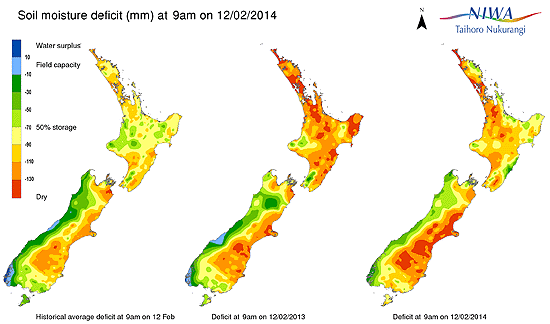
Here are the key things you need to know before you leave work today.
TOURISM GROWS
Guest nights and occupancy rates for our tourism accommodation industry rose in December but at a slower rate that the month before, according to data out today. The December overall occupancy rate was at its best level in over a decade. The stronger data came from international visitors and North Island venues.
RETAIL SALES RISE PAUSES
The first look at retail sales activity for January came today in the data released on electronic card transactions and at +6.4% year-on-year was better growth than reported for December, and the best since January 2008. StatsNZ focused on a decline in the seasonally adjusted results, as did the economists.
MORTGAGE APPROVALS SLOW DOWN
Home loan approvals last week (The Waitangi Day short week) were down as expected and about 7.5% fewer than the same Waitangi Day week a year earlier. The values approved were 9.6% lower.
'TRADE AGREEMENTS BENEFIT ALL KIWIS'
Tim Groser has mounted a spirited defense of the TPP process in a speech to the NZ-China Council in Auckland today.
OUR DECEMBER KIWISAVER COMPARISONS ARE NOW AVAILABLE
The KiwiSaver return data tables covering the period to December 31, 2013 have been updated. Actively managed KiwiSaver schemes offered by the main trading banks (i.e. ANZ and Westpac) are amongst the top performers across many of the categories we monitor.
ANZ, Milford, Mercer and Westpac dominate the ranking table across the diversified portfolios. Milford and Mercer continue to outperform many other managers in the more aggressive and single sector funds.
With share markets continuing to perform strongly it is not surprising that many of the more aggressive or equity dominant funds are providing returns in excess of 20%. The more conservative KiwiSaver strategies are providing returns well in excess of bank term deposits.
WHOLESALE RATES TREND UP
Swap rates and 90 day bank bill rates are both up again, another 2 bps today. That takes the 90 day bank bill rate to 2.93%, its highest since September 2011.
OUR CURRENCY RISES
The NZD continued its upward bias in trading today and is now about 83.4 USc. However we traded in a very narrow range against the Aussie today.

13 Comments
Countdown allegations: if you control the food supply, you control the population, as the Soviet Bloc & Khymer Rouge perpetrated.
2 companies monopolise all retail food in NZ, they can charge what they like. They seem to have agreements to have geographic exclusivity ie leave zones to each other.
More competition could help.
I thoroughly agree with you MB, and most would, more competition is always good for the consumer. However, as an aside, funny isn't when a political party, or group of parties, claim that less competition would make things cheaper for us (i.e. electricity) greed suddenly makes many of us to want to believe the opposite by forgeting this basic concept
The last time we had a run of 7 weeks straight where mortgage approvals were less that $1 billion/ week was two years ago. It would seem the market has definitely peaked. If it continues to go up then there is only one conclusion: overseas money.
This supplier claims he’s been blackmailed by a supermarket buyer.
‘At some stage we started feeling—and this is what I hear from other companies as well—that their behaviour was really blackmailing,’ the supplier says. ‘The supermarkets expect a certain quantity of sales from your products and if that is not met they request a lump sum of money to be passed on to pay for that shortfall. Or another example is being asked to pay to be on the shelf in the first place, and that would mean a lump sum that has to be paid.’
Mr McLeod, Coles Managing Director, says the company thoroughly investigates every allegation of illegal market behaviour.
http://www.abc.net.au/radionational/programs/backgroundbriefing/2013-03…
The transcript is worth a read..... as an example....
Hagar Cohen: So would you say the threats of deletion unless a supplier subscribes to a trading term, for example, is against Coles policies and guidelines?
Ian McLeod: Absolutely.
Hagar Cohen: But this is a growing concern.
The former CEO of Aristocrat Foods, Barry Fawcett, says they were constantly threatened with deletion. In other words, taken off the shelves.
Barry Fawcett: Yes, constantly. Constantly.
Hagar Cohen: And so they'd tell you that specifically 'you might be gone soon'?
Barry Fawcett: They would normally flag a product that was in question by moving your product from a specific place on the shelf down maybe one or two shelves down, and that was virtually the beginning of the end. If you know your product had dropped two shelves, you then had to do something about it.
Hagar Cohen: How much notice would you be getting before deletion?
Barry Fawcett: Not a great deal of time. You'd be brought in maybe three weeks, asked what you were going to do about it, and if you couldn't resolve it you'd be gone within that period.
Hagar Cohen: And that's both Coles and Woolworths?
Barry Fawcett: Yes, they had the same philosophy. If you didn't address the issue and do something about it and couldn't, in their terms, show a better return for Woolworths or Coles, they would delete you.
Hagar Cohen: Does that mean, in other words, 'give us a discount'?
Barry Fawcett: It could be interpreted that way, definitely.
Hagar Cohen: And how did you interpret it?
Barry Fawcett: Well, a lot depended on whether or not we had stock packed off, whether or not we were really conscious of retaining the product, and if we were we may give them, for instance, an additional rebate of 5% for three months.
Hagar Cohen: 'Rebates' are industry jargon for discounts. The retailers charge their suppliers a rebate, a fee for different things. Barry Fawcett says those fees were on the rise.
Barry Fawcett: If somebody in a higher position than a buyer, they thought up some new scheme that they could get half a percent out of their suppliers, you work out a half percent out of total sales Woolworths or Coles, it was an enormous amount of money. And they were constantly working on it.
Hagar Cohen: One of the rebates Barry Fawcett disagreed with involved the level of discounting of his products. Coles demanded a bigger price cut from him than they would offer the costumer in the store, therefore increasing their own profits.
Barry Fawcett: If your product was promoted in a supermarket and Aristocrat bread-and-butter cucumbers were on special for the week, they might say you would get the supermarket 10% and they might reduce it 7%. So they would be benefiting for that period the product was on promotion.
Hagar Cohen: Coles have always claimed that they absorb the cost of their discounting. But managing director Ian McLeod now says suppliers do share the burden of discounting, only because some of their profit margins are too high.
Ian McLeod: I think what we've done is negotiated firmly but fairly. If you are seeing suppliers who have got profit margins that are maybe four or five times the rate of your own profit margins, than if you're looking at the share of the investment in terms of bringing prices down, we felt as though the suppliers in some instances could contribute more.
Like the charm of a local market but the convenience of a one-stop supermarket? There's concern Australia's supermarket giants are trying to muscle in on the popularity of farmers markets by beefing up their fresh food credentials. But are they really taking on the small guys, or is it just a battle for perception over reality? We walk and talk through the aisles and the stalls.
http://www.abc.net.au/radionational/programs/rnfirstbite/fresh-food-war…
The ACCC is investigating Coles and Woolworths for bullying business tactics that have forced some food suppliers to end their relationships with the supermarket giants, while others struggle to survive, writes Hagar Cohen.
Barry Clarke refuses to work with Coles and Woolworths.
A decade ago, the South Australian dairy farmer was fed up with the low prices he was getting for his milk. So one day, while on a family holiday, he decided to embark on the biggest financial risk of his life, and open his own milk processor.......
He says the only way to avoid being abused by the supermarkets is to steer clear of them in the first place. Even if it means alienating a big percentage of his target market.
http://www.abc.net.au/news/2013-03-27/cohen---supermarkets/4597262
Supermarket giant Coles has surprised its rival Woolworths by secretly buying one of Woolworths’ most profitable Sydney stores.
Woolworths confirmed that Coles recently bought its store in Neutral Bay, which is on Sydney’s lower North Shore. A Woolworths spokesperson said the purchase by Coles had not been anticipated.
According to internal reports obtained by Fairfax Media journalists, Coles paid $40 million for the centre that the Woolworths store is part of, concealing its involvement in the purchase by using a $10 company based in the tax haven of the British Virgin Islands.
The lease on the Neutral Bay store reportedly expires in 2014 but can be renewed for a further 10 years. Under the terms of the lease as the landlord, Coles would have a right to inspect the store’s sales records for the site, since part of the rental is based on a percentage of sales.
It is rumoured that the Coles surprise move included an element of revenge for the earlier Woolworth move that pushed Coles out of its Katoomba site in the Blue Mountains in late 2012. Woolworths bought the site in 2000. Coles had operated on that site for 30 years.
http://www.ausfoodnews.com.au/2013/03/25/coles-secretly-buys-woolworths…
Even this government has recently woken up to the fact that expensive housing is not the fault of the cardie-wearers alone. The entire supply-chain from grass paddock to house-warming party is riddled with economic inefficiency largely because monopolies and duopolies dominate our tiny market. University economist, Eric Crampton, estimated the "bought in NZ penalty" at about 40% for small imported items like electronic goods. It's probably a good estimate for the whole economy.
I occassionally look at bare land prices for my next design and build project, more to keep in touch rather than expecting to buy. A pre-requisite for me is that a site has to have building materials to hand. That could be timer, stone or the right quality of dirt for rammed earth. It is about doing everything you can to bypass the middlemen and finance.
You are on the right track..
The point maybe over reach:
take a look at this blokes thinking:
http://www.abc.net.au/news/2014-02-12/roger-montgomery-talks-to-the-bus…
commenting on:
http://www.abc.net.au/news/2014-02-12/extended-interview-with-ian-narev…
We see move benefits in Fonterra, rather than otherwise. If an alternative was how dairy is in Ozz, then concentrate taking off edges Fonterra may have here.
Consider the corporate and country types Fonterra is up against and so much depends on the thinking of the exe running the show. Compare for example the bloke running Fonterra, with the one running Coles.
footprints in the digital last a long time, some are Ok:
http://www.dailymotion.com/video/xjui5h_whoops-apocalypse-episode-1-par…
Thanks for the links.
Lets break up the two supermarket chains into a minimum of 12 competing companies. Be great for consumers, our food producets, and not least, the quality of food.

We welcome your comments below. If you are not already registered, please register to comment
Remember we welcome robust, respectful and insightful debate. We don't welcome abusive or defamatory comments and will de-register those repeatedly making such comments. Our current comment policy is here.